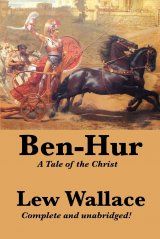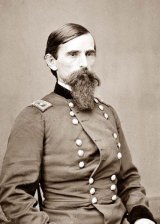Ben-Hur Page #18
Ben-Hur: A Tale of the Christ is a novel by Lew Wallace, published by Harper and Brothers on November 12, 1880, and considered "the most influential Christian book of the nineteenth century". It became a best-selling American novel, surpassing Harriet Beecher Stowe's Uncle Tom's Cabin in sales.
they did not care for the view which presently rose before them in the utmost magnificence: for the village first to receive them on Bezetha; for Mizpah and Olivet, over on their left; for the wall behind the village, with its forty tall and solid towers, superadded partly for strength, partly to gratify the critical taste of the kingly builder; for the same towered wall bending off to the right, with many an angle, and here and there an embattled gate, up to the three great white piles Phasaelus, Mariamne, and Hippicus; for Zion, tallest of the hills, crowned with marble palaces, and never so beautiful; for the glittering terraces of the temple on Moriah, admittedly one of the wonders of the earth; for the regal mountains rimming the sacred city round about until it seemed in the hollow of a mighty bowl. They came, at length, to a tower of great height and strength, overlooking the gate which, at that time, answered to the present Damascus Gate, and marked the meeting-place of the three roads from Shechem, Jericho, and Gibeon. A Roman guard kept the passage-way. By this time the people following the camels formed a train sufficient to draw the idlers hanging about the portal; so that when Balthasar stopped to speak to the sentinel, the three became instantly the centre of a close circle eager to hear all that passed. "I give you peace," the Egyptian said, in a clear voice. The sentinel made no reply. "We have come great distances in search of one who is born King of the Jews. Can you tell us where he is?" The soldier raised the visor of his helmet, and called loudly. From an apartment at the right of the passage an officer appeared. "Give way," he cried, to the crowd which now pressed closer in; and as they seemed slow to obey, he advanced twirling his javelin vigorously, now right, now left; and so he gained room. "What would you?" he asked of Balthasar, speaking in the idiom of the city. And Balthasar answered in the same, "Where is he that is born King of the Jews?" "Herod?" asked the officer, confounded. "Herod's kingship is from Caesar; not Herod." "There is no other King of the Jews." "But we have seen the star of him we seek, and come to worship him." The Roman was perplexed. "Go farther," he said, at last. "Go farther. I am not a Jew. Carry the question to the doctors in the Temple, or to Hannas the priest, or, better still, to Herod himself. If there be another King of the Jews, he will find him." Thereupon he made way for the strangers, and they passed the gate. But, before entering the narrow street, Balthasar lingered to say to his friends, "We are sufficiently proclaimed. By midnight the whole city will have heard of us and of our mission. Let us to the khan now." CHAPTER XIII That evening, before sunset, some women were washing clothes on the upper step of the flight that led down into the basin of the Pool of Siloam. They knelt each before a broad bowl of earthenware. A girl at the foot of the steps kept them supplied with water, and sang while she filled the jar. The song was cheerful, and no doubt lightened their labor. Occasionally they would sit upon their heels, and look up the slope of Ophel, and round to the summit of what is now the Mount of Offence, then faintly glorified by the dying sun. While they plied their hands, rubbing and wringing the clothes in the bowls, two other women came to them, each with an empty jar upon her shoulder. "Peace to you," one of the new-comers said. The laborers paused, sat up, wrung the water from their hands, and returned the salutation. "It is nearly night--time to quit." "There is no end to work," was the reply. "But there is a time to rest, and--" "To hear what may be passing," interposed another. "What news have you?" "Then you have not heard?" "No." "They say the Christ is born," said the newsmonger, plunging into her story. It was curious to see the faces of the laborers brighten with interest; on the other side down came the jars, which, in a moment, were turned into seats for their owners. "The Christ!" the listeners cried. "So they say." "Who?" "Everybody; it is common talk." "Does anybody believe it?" "This afternoon three men came across Brook Cedron on the road from Shechem," the speaker replied, circumstantially, intending to smother doubt. "Each one of them rode a camel spotless white, and larger than any ever before seen in Jerusalem." The eyes and mouths of the auditors opened wide. "To prove how great and rich the men were," the narrator continued, "they sat under awnings of silk; the buckles of their saddles were of gold, as was the fringe of their bridles; the bells were of silver, and made real music. Nobody knew them; they looked as if they had come from the ends of the world. Only one of them spoke, and of everybody on the road, even the women and children, he asked this question--'Where is he that is born King of the Jews?' No one gave them answer--no one understood what they meant; so they passed on, leaving behind them this saying: 'For we have seen his star in the east, and are come to worship him.' They put the question to the Roman at the gate; and he, no wiser than the simple people on the road, sent them up to Herod." "Where are they now?" "At the khan. Hundreds have been to look at them already, and hundreds more are going." "Who are they?" "Nobody knows. They are said to be Persians--wise men who talk with the stars--prophets, it may be, like Elijah and Jeremiah." "What do they mean by King of the Jews?" "The Christ, and that he is just born." One of the women laughed, and resumed her work, saying, "Well, when I see him I will believe." Another followed her example: "And I--well, when I see him raise the dead, I will believe." A third said, quietly, "He has been a long time promised. It will be enough for me to see him heal one leper." And the party sat talking until the night came, and, with the help of the frosty air, drove them home. * * * * * * Later in the evening, about the beginning of the first watch, there was an assemblage in the palace on Mount Zion, of probably fifty persons, who never came together except by order of Herod, and then only when he had demanded to know some one or more of the deeper mysteries of the Jewish law and history. It was, in short, a meeting of the teachers of the colleges, of the chief priests, and of the doctors most noted in the city for learning--the leaders of opinion, expounders of the different creeds; princes of the Sadducees; Pharisaic debaters; calm, soft-spoken, stoical philosophers of the Essene socialists. The chamber in which the session was held belonged to one of the interior court-yards of the palace, and was quite large and Romanesque. The floor was tessellated with marble blocks; the walls, unbroken by a window, were frescoed in panels of saffron yellow; a divan occupied the centre of the apartment, covered with cushions of bright-yellow cloth, and fashioned in
Translation
Translate and read this book in other languages:
Select another language:
- - Select -
- 简体中文 (Chinese - Simplified)
- 繁體中文 (Chinese - Traditional)
- Español (Spanish)
- Esperanto (Esperanto)
- 日本語 (Japanese)
- Português (Portuguese)
- Deutsch (German)
- العربية (Arabic)
- Français (French)
- Русский (Russian)
- ಕನ್ನಡ (Kannada)
- 한국어 (Korean)
- עברית (Hebrew)
- Gaeilge (Irish)
- Українська (Ukrainian)
- اردو (Urdu)
- Magyar (Hungarian)
- मानक हिन्दी (Hindi)
- Indonesia (Indonesian)
- Italiano (Italian)
- தமிழ் (Tamil)
- Türkçe (Turkish)
- తెలుగు (Telugu)
- ภาษาไทย (Thai)
- Tiếng Việt (Vietnamese)
- Čeština (Czech)
- Polski (Polish)
- Bahasa Indonesia (Indonesian)
- Românește (Romanian)
- Nederlands (Dutch)
- Ελληνικά (Greek)
- Latinum (Latin)
- Svenska (Swedish)
- Dansk (Danish)
- Suomi (Finnish)
- فارسی (Persian)
- ייִדיש (Yiddish)
- հայերեն (Armenian)
- Norsk (Norwegian)
- English (English)
Citation
Use the citation below to add this book to your bibliography:
Style:MLAChicagoAPA
"Ben-Hur Books." Literature.com. STANDS4 LLC, 2024. Web. 26 Nov. 2024. <https://www.literature.com/book/ben-hur_1675>.




Discuss this Ben-Hur book with the community:
Report Comment
We're doing our best to make sure our content is useful, accurate and safe.
If by any chance you spot an inappropriate comment while navigating through our website please use this form to let us know, and we'll take care of it shortly.
Attachment
You need to be logged in to favorite.
Log In